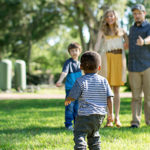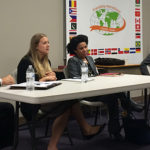A federal judge declared the foster-care system in Texas broken, but Christians should be accustomed to redemptive work in a damaged and sin-filled world, some advocates for foster parenting insist.
 John DeGarmo“Every system is broken in some fashion, because they all are run by human beings,” said John DeGarmo, a foster parent more than 13 years, who travels extensively around the country from his Georgia home to speak about foster care. “We are called to show unconditional love—the same as God has for his children.”
John DeGarmo“Every system is broken in some fashion, because they all are run by human beings,” said John DeGarmo, a foster parent more than 13 years, who travels extensively around the country from his Georgia home to speak about foster care. “We are called to show unconditional love—the same as God has for his children.”
Some of God’s children are more vulnerable than others. In December, U.S. District Judge Janis Jack of Corpus Christi ruled Texas violated the constitutional rights of foster children by exposing them to unreasonable risk in a system where they “often age out of care more damaged than when they entered.”
Read related Baptist Standard articles about foster care:
East Texas family onboard the ‘foster care love train’
Commentary: The Rio Grande Valley needs families for children
For more information, visit:
http://www.buckner.org/foster-care-adoption
Sign up for our weekly edition and get all our headlines in your inbox on Thursdays
http://www.childrenatheartministries.org/STARRY-Foster-Care
http://discoverbcfs.net/FosterCare
Most critiques of the foster-care system focused on Child Protective Services caseworkers—a group DeGarmo identifies as “overwhelmed, overworked, underpaid and under-resourced.”
The Texas Tribune reported Texas caseworkers last year had to track an average of 28 children any given time; the Child Welfare League of America recommends social workers handle no more than 17 children at the same time.
But the state also desperately needs individuals and couples to serve as foster parents—a need the church can address.
Foster parents particularly needed for siblings
 Samela Macon“We have a tremendous need for foster families,” said Samela Macon, senior director of domestic foster care and adoption for Buckner Children and Family Services. “There’s a shortage of families and a shortage of families who can take in sibling groups.”
Samela Macon“We have a tremendous need for foster families,” said Samela Macon, senior director of domestic foster care and adoption for Buckner Children and Family Services. “There’s a shortage of families and a shortage of families who can take in sibling groups.”
In January, Child Protective Services removed 481 more children from their homes compared to the same month last year, the Texas Department of Family and Protective Services reported. Due to a shortage of foster families, some of those children had to spend at least two nights in CPS offices.
“Beyond providing places of safety, foster families provide love and stability for children at their most vulnerable,” Macon said. “Texas needs families to step forward to care for these children in need.”
Children traumatized by abuse or neglect suffer more when they are removed from a familiar area or culture, but some parts of the state particularly lack sufficient numbers of foster families, and children end up hundreds of miles away from their homes. For instance, about 200 children from the Rio Grande Valley last year were placed outside the region.
Needs are great in some of the largest population centers in Texas—Dallas-Fort Worth, Houston and San Antonio—but they also extend to less-populated regions such as West Texas, Macon noted.
“Texas is such a big state with such diversity, there are a variety of needs,” she said.
Problems are compounded when siblings are separated, Macon noted.
“Many of the children are caregivers for their siblings,” she explained. “When sibling groups are pulled apart and the children placed in separate homes, they are retraumatized.”
Texas also needs families willing to provide specialized therapeutic care for children who face developmental, social, educational and emotional challenges, she added.
One family’s story
DeGarmo was teaching in rural Georgia when he first encountered children from troubled homes.
 John and Kelly DeGarmo have six children of their own, three who entered their family biologically and three former foster children they adopted— (top, left to right) Kolby, Jace, Brody, (bottom, left to right) Cassie, Grace and Brailey.“What can I do to make a difference?” he asked.
John and Kelly DeGarmo have six children of their own, three who entered their family biologically and three former foster children they adopted— (top, left to right) Kolby, Jace, Brody, (bottom, left to right) Cassie, Grace and Brailey.“What can I do to make a difference?” he asked.
At that point, he and his wife, Kelly, felt God’s calling to become foster parents. Over the last 13 years, the DeGarmos have opened their home to 50 children at various times. Currently, they are foster parents to five children, plus six children of their own—three who entered their family biologically and three former foster children whom they adopted.
“There are no labels—biological, adopted or foster—in our house,” he said. “They are all my children.”
But while some of the children will remain in their household until they reach adulthood, others will live with the DeGarmos only a matter of days, weeks or months.
 “It is the hardest thing I’ve ever done—and the most important thing I’ve done, as well,” said DeGarmo, author of Faith and Foster Care: How We Impact God’s Kingdom, a new book from New Hope, the publishing arm of Woman’s Missionary Union.
“It is the hardest thing I’ve ever done—and the most important thing I’ve done, as well,” said DeGarmo, author of Faith and Foster Care: How We Impact God’s Kingdom, a new book from New Hope, the publishing arm of Woman’s Missionary Union.
When DeGarmo travels around the country, speaking to groups about foster care and seeking to enlist foster parents, he offers an honest picture of what foster parenting involves.
“I go to work to rest. There’s a lot of anxiety and trauma at my house,” he said. “Every child is different, and every anxiety they face and every trauma they have experienced is different.”
That’s why Buckner Children and Family Services offers “wrap-around care” to foster families, Macon said. From home student assessments and up to 50 hours of training a year, to counseling and case management, to monthly supervisory visits and 24-hour on-call support, Buckner seeks to provide the resources foster families need—including helping them deal with the grief of loss when a foster child leaves their care to live with a family member.
Other ways to help
While not every Christian family is called and gifted to serve as a foster family, both DeGarmo and Macon noted, other believers can help provide for vulnerable children and support foster parents in a variety of ways.
• Advocacy. “Christians are called to step up and be a voice for those who feel they are without hope, disconnected and alone,” Macon said.
That involves learning about the needs of abused and neglected children in particular communities, she said. It also includes discovering the needs of foster parents and finding ways to support them.
“Passion drives the call to action. Christians have great potential to step up and make a difference,” she said.
• Education. Some individuals who may not be suited to provide foster care in their own homes can become liaisons between social service agencies and congregations. That role involves providing access to information, helping prospective foster families connect to appropriate agencies and encouraging church members to consider whether they might be called by God to become foster families, Macon explained.
She suggested as one helpful resource Ready or Not: A 30-Day Discovery for Foster and Adoptive Parents by Pam Parish, founder of Connections Homes in Atlanta, Ga.
“A church can help families go through the introspective journey by going through the devotional together,” she said.
• Respite care. DeGarmo remembers when he and his wife had seven children in diapers at the same time. Churches can help overwhelmed foster parents by giving them a break—a few hours or a long weekend—to rest and regroup, he noted.
Buckner and other agencies offer training for families who want to provide substitute or respite care for foster parents.
• Resources. Churches can help foster families meet basic needs by providing toiletry items, school supplies and duffel bags, Macon noted.
“Some of the children arrive with their possessions in a garbage bag. More often, they arrive with nothing,” she said. “Just by providing duffel bags, churches enable children to carry their belongings with dignity.”
• Visitation. Foster children may be involved in court-mandated visits with relatives on a regular basis. Churches can make their facilities available as a visitation site.
“The church can be a safe haven for visitation,” DeGarmo said. “It can provide a neutral environment where all involved know they are welcome.”
• Prayer. Everyone involved in the foster care system—the children, their birth parents, their foster parents, caseworkers assigned to oversee them—need prayer, DeGarmo noted.
“Remember, many of these parents are hurting. If there is abuse, it’s likely generational,” he said.
Macon does not minimize the challenges of addressing the needs of children in foster care—or the challenges parents face when they foster—but she also recognizes Christians have resources beyond those offered by any placement agency.
“There is no problem too great for our God,” she said. “If we are true to our mission to serve the most vulnerable, God will pave the way.”















We seek to connect God’s story and God’s people around the world. To learn more about God’s story, click here.
Send comments and feedback to Eric Black, our editor. For comments to be published, please specify “letter to the editor.” Maximum length for publication is 300 words.